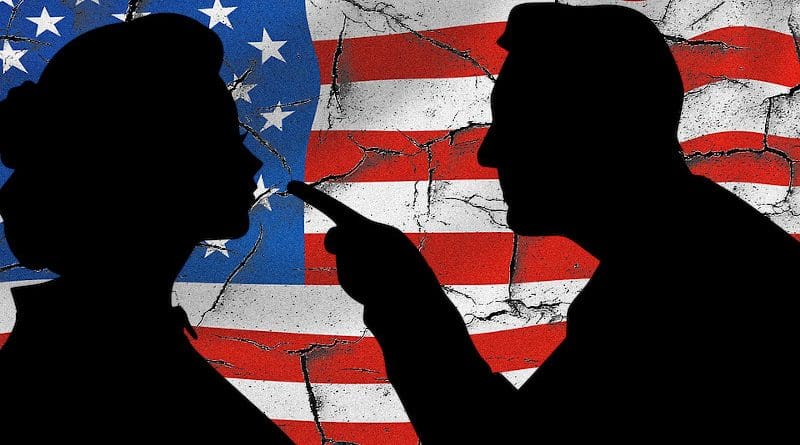America’s Dueling Narratives Are Its Greatest Political Risk – OpEd
By Observer Research Foundation
The new reality of calling into question the victory of candidates one doesn’t agree with — in which both dueling Republican and Democratic narratives are squarely to blame — is something new in American politics.
By John C. Hulsman*
C.S. Lewis, the great British writer and theologian, was surely onto something when he said: “What you see and what you hear depends a great deal on where you are standing.” At present, Democrats and Republicans in the US are standing on different planets.
Take President-Elect Joe Biden’s rather eloquent view that the time has come to heal America’s increasingly poisonous partisan divisions. A large number of my Democratic friends from my decade in Washington have spoken to me wonderingly, asking why Republicans don’t accept the 2020 result, or Biden as the ‘legitimate’ president. I, in turn, am baffled at their astounding lack of self-knowledge.
From the minute Donald Trump’s shock 2016 victory became clear, a huge cohort of Democrats set out to undermine him. Hillary Clinton’s unsubstantiated opposition research into Trump served as the basis for the outgoing Obama administration’s authorisation for spying into the incoming Trump team’s doings. There has been nary a word from Democrats as to the fact that this was despicable, and very wrong.
Following on from the spying, Special Counsel Robert Mueller spent 22 months and $35 million investigating the Russian collusion story, paralysing two years of the Trump administration. In the end, an underlying crime was not substantiated, as there is absolutely no evidence that Russian computer bots convinced a single voter in Wisconsin to ditch voting for Hillary Clinton, let alone altered the outcome of the election.
Then came the farcical impeachment mini-drama, which sought to criminalise Trump’s boorish efforts to get the Ukrainian government to investigate ne’er-do-well Hunter Biden’s pathetic efforts to make money off his family’s name.
Finally, mocking him at every turn, ‘the resistance,’ as many in the Democratic commentariat styled themselves, surely did not afford Trump legitimacy, or even common decency. The mainstream media, losing its mind in its indignation at Trump’s victory, wholly threw over the notion of objectivity, becoming little more than a bastion of Democratic Party revulsion.
Given the reality of all that has come before, now that the Democrats have triumphed, it is the height of unreality to expect Trump supporters to come down with the world’s worst case of collective amnesia, and forget how their man was treated.
But while the Democrats in 2016 started this descent towards political calamity, the Trump White House — in becoming the sorest losers ever — have coarsened the political discourse by another gigantic notch.
Echoing their leader’s favorite attack mode, Trump supporters have engaged in what is known in debating terms as ‘whataboutism,’ excusing their absolutely inexcusable behavior by pointing to the supposed misdeeds of others. Yes, the Democrats are conveniently forgetting that they never truly accepted Trump as the legitimate president, but that does not remotely begin to make alright the perilously extra-constitutional Republican behavior characterising the post-2020 election.
A staggering Fox News poll of 9 December 2020, illustrates the extent of the problem. When asked, ‘Was the election stolen from Trump?’ 36 percent of all voters, and an eye-catching 77 percent of Trump voters, say yes, all facts to the contrary.
Equally striking is how slow the majority of the Republican establishment in Washington — with honourable notable exceptions such as Senator Mitt Romney of Utah — has been in acknowledging Biden’s victory. Cowed by Trump’s dominant position in the party, the cowardly GOP establishment has said nothing, despite knowing better, in an effort not to enrage Trump’s base.
But, as the New York Times (which it must be pointed out is hardly a neutral source anymore) reported this past Friday, Trump personally is fanning these very dangerous flames. During a chaotic and highly contentious recent White House meeting, the petulant outgoing president briefly mulled declaring martial law to try to overturn Biden’s victory.
Trump’s shameful, explosive temper tantrum has been dangerously egged on by former National Security Adviser Michael Flynn, who has claimed that the president “could take military capabilities and he could place them in states and basically re-run an election in each of these (battleground) states.” While a coup will never happen, suffice it to say Biden is unlikely to be accorded the usual standard of democratic legitimacy by at least a large minority of Trump’s 74 million incensed voters, as he narcissistically nurtures their sense of grievance.
The new reality of calling into question the victory of candidates one doesn’t agree with — in which both dueling Republican and Democratic narratives are squarely to blame — is something new in American politics. It amounts to the single biggest political risk now facing what remains by a long way the most powerful country in the world.
The US, for centuries a bastion of political stability, has had one republic while the French have had five. The republic endured the aftermath of the Revolution, Civil War, rapid industrialisation, World Wars I and II, the Great Depression, Red scares, Vietnam, and Watergate. This is because the institutions put in place by the country’s brilliant founders, based on compromise and unquestionably accepting the political legitimacy of opposition views and opposition victories, has led to a remarkable durability and resilience.
This is what is presently at stake in American politics; the country’s precious long-term political stability itself. President Richard Nixon put it perfectly: “No power on earth can defeat or humiliate the US, except the US.” The political risk is us.

